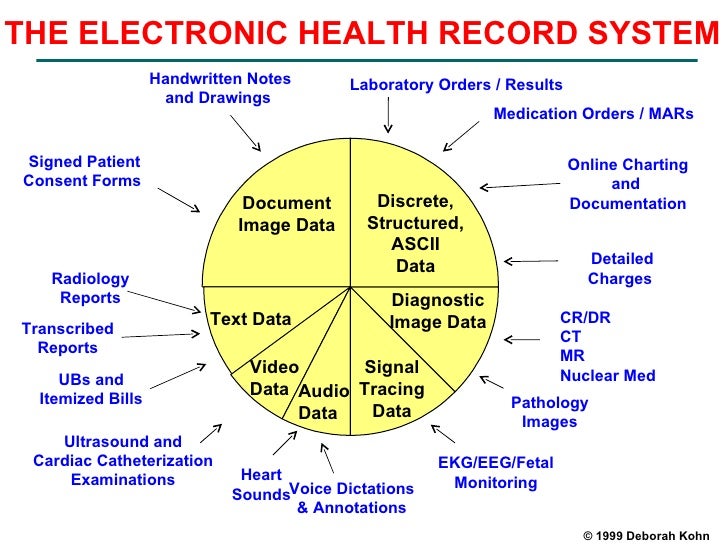Patient safety errors are common with electronic health.

Electronicmedicalrecord (emr): an electronic record of healthcare information of an individual that is created, gathered, managed, and consulted by authorized clinicians and staff within one healthcare organization. electronic health record (ehr): an electronic record of healthcare information of an individual that conforms to recommended interoperability standards for hit and that are. Feb 24 2019. how electronic health records are impacting the healthcare industry. by lauren adley, writer and editor, uk best essays. lauren adley. the healthcare industry has traditionally relied on the pen-and-paper archiving system, creating huge but impractical data libraries. Electronic medical record (emr) systems, defined as "an electronic record of health-related information on an individual that can be created, gathered, managed, and consulted by authorized clinicians and staff within one health care organization," have the potential to provide substantial benefits to physicians, clinic practices, and health. Singh, hardeep, david c. classen, and dean f. sittig. “creating an oversight infrastructure for electronic health record-related patient safety hazards,” 169. hoffman, sharona, and andy podgurski. “finding a cure: the case for regulation and oversight of electronic health record systems,” 135. ibid. ash, joan s. et al.
The health care landscape communication and interoperability are fragmented and lack cohesive interconnectivity between providers, hospitals, patients and payors. for example, when a patient requests his or her health record, a provider may require the patient to come into the office to sign a release. The health insurance portability and accountability act (hipaa) made it legal to review medical records, but it didn't guarantee electronic access. more than 250 health care organizations in the u. s. (including multiple locations within a single system) are already sharing notes with patients digitally. Electronic health records do more than collect and store patient information. increasingly, these records compute and communicate the data, providing insights that can make a difference in treatment. healthit. gov reports that 75 percent of healthcare providers say their ehr enables them to deliver better patient care which results in electronic patient record healthcare higher.
An electronic health record (ehr) is the systematized collection of patient and population electronically stored health information in a digital format. these records can be shared across different health care settings. records are shared through network-connected, enterprise-wide information systems or other information networks and exchanges. ehrs may include a range of data, including. Information governance. a medical record in paper or electronic format provides a written account of a patient's medical history, containing information about diagnosis, treatment, chronological progress notes and discharge recommendations. Electronic health records (ehrs) are consistently used by external organizations to track the quality of care provided based on the information documented in the medical record, which affects hospital accreditation and reimbursement. 1 however, there's concern that technology may cause some patients to feel as if nurses and other practitioners are documenting for the institution instead of caring for them. 1 therefore, with the integration of bedside nursing and ehrs, nurses must understand.
Ehr Electronic Health Records Emr Software 75health
Financial terms of the deal between net health and casamba llc of agora hills, california, weren’t disclosed. casamba, like net health, has software and apps for record keeping and analytics for post-acute care facilities. For healthcare trusts and providers electronic patient record healthcare still using written records and charts, an electronic patient record (epr) system has the potential to help improve outcomes for patients in your care. servelec’s rio epr is a fully-integrated clinical information solution, which supports the delivery of secondary care across child, community and mental health. An electronic health record (ehr) is an electronic version of a patients medical history, that is maintained by the provider over time, and may include all of the key administrative clinical data relevant to that persons care under a particular provider, including demographics, progress notes, problems, medications, vital signs, past medical.
75health provides cloud-based electronic health records (ehr) and electronic medical records (emr) software for doctors, clinics, and hospitals. Apr 02, 2015 · a summary care record (scr) is stored at a central location. the record will not contain a patient's full medical history but will include essential health information, such as prescribed medication and allergies. access to a patient's scr will be restricted to healthcare staff providing care for the patient. This patient access api will allow patients to access their data through any third party application they choose to connect to the api and could also be used to integrate a health plan’s information to a patient’s electronic health record (ehr).
The clinician’s notes from the patient’s hospital stay can help inform the discharge instructions and follow-up care and enable the patient to move from one care setting to another more smoothly. so, yes, the difference between “electronic medical records” and “electronic health records” is just one word. The electronic health record (ehr) is a more longitudinal collection of the electronic health information of individual patients or populations. the emr, in contrast, is the patient record created by providers for specific encounters in hospitals and ambulatory environments, and which can serve as a data source for an ehr. 75health provides cloud-based electronic health records (ehr) and electronic medical records (emr) software for doctors, clinics, and hospitals. covid-19 and hipaa resources. cloud-based ehr-efficient, fast and secure. we are not about just being paperless, but built for the cloud. our platform is about simplifying working with intelligent. Phrs are not the same as electronic health records (ehrs), also called electronic medical records (emrs), which are owned and maintained by doctors' offices, hospitals or health insurance plans.. ehrs typically contain the same basic information you would put in a phr, such as your date of birth, medication list and drug allergies. but ehrs contain more extensive information because they're.
Well-organized and effective patient care is key to a successful and well run medical practice. in this day and age, medical practices are moving towards patient portals and electronic records. emr is the electronic medical records that are the digital version of the paper charts in the clinician’s office. in one practice, the emr enables the healthcare providers to maintain the medical and. per month/provider, office ally™ offers a electronic patient record healthcare comprehensive electronic health records program that allows healthcare providers to spend more time with patients and less time on paperwork we believe an

Security Improvements To Singapores National Electronic

Ehr, electronic health records, emr software 75health.
Mar 15, 2021 · the best ehr (electronic health record) software helps with the management of patient care in a health practice, from logistics to working with patient records, prescriptions, and billing. With athenahealth’s electronic health records service, you can be sure you’re getting a cloud-based medical records service that intuitively organizes the patient visit, helps providers document faster and more accurately, and sets your practice up for future success whether you’re a small practice or a large healthcare system. The best ehr (electronic health record) software helps with the management of patient care in a health practice, from logistics to working with patient records, prescriptions, and billing.
An electronic health record (ehr) is a digital version of a patient’s paper chart. ehrs are real-time, patient-centered records that make information available instantly and securely to authorized electronic patient record healthcare users. while an ehr does contain the medical and treatment histories of patients, an ehr system is built to go beyond standard clinical data collected in a provider’s office and can be inclusive. Figure. electronic health records (ehrs) are consistently used by external organizations to track the quality of care provided based on the information documented in the medical record, which affects hospital accreditation and reimbursement. 1 however, there's concern that technology may cause some patients to feel as if nurses and other practitioners are documenting for the institution.

Apr 21, 2017 · april 21, 2017 electronic health record users are highly prone to making medication errors that negatively impact patient safety, says the pennsylvania patient safety authority in a recent report. close to 70 percent of all medication errors reach the patient, with approximately one-third of mistakes occurring during the administration process. An electronic health record (ehr) is a digital version of a patient’s paper chart. ehrs are real-time, patient-centered records that make information available instantly and securely to authorized users. Electronic health records. an electronic health record (ehr) is an electronic version of a patients medical history, that is maintained by the provider over time, and may include all of the key administrative clinical electronic patient record healthcare data relevant to that persons care under a particular provider, including demographics, progress notes, problems, medications, vital signs, past medical history, immunizations, laboratory data and radiology reports the ehr automates access to information and has the potential.
